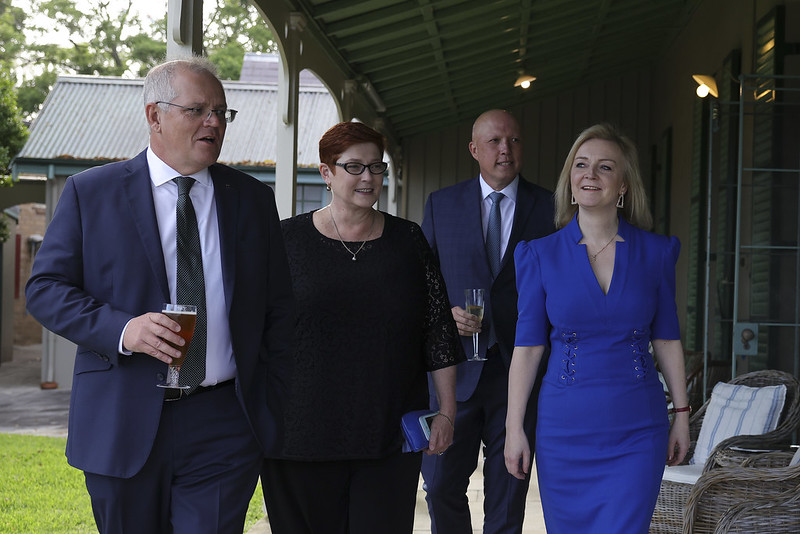Election opportunity to move from boofhead to smart diplomacy
April 26, 2022
Recent foreign policy experience shows bullying and belligerence dont work. Prime Minister Scott Morrison cares little about Australias foreign policy outcomes. Neither does he care for Australias international reputation. He cares least of all about our national interests. Indeed, he consistently damages them for his own political gain. The federal election offers Australia an opportunity for a reset.
Australias national interests dont change with elections or PMs. Australias national interests lie in a strong capacity to persuade and influence the world without coercion so called smart-power. It is fair to say that until recently, Australian foreign policy has been largely bipartisan. Foreign interests have mostly been quarantined from domestic politics and Prime Ministers have entrusted their Foreign Ministers to lead. But the current Prime Minister has turned these principles on their heads. He applies to foreign policy the same tactics as he does domestically. But bullying, gas lighting and toxic masculinity dont work in public policy, least of all in foreign policy.
The Prime Minister aligned himself with Trump right from the start and went further by seeking an invitation to the White House for Hillsong pastor Brian Houston. He then trashed our relations with France by lying to President Macron and leaking his confidential messages about the AUKUS submarine deal. Relations with France need to be closer than ever given Brexit and developments in the Pacific, but we are now barely speaking. The Prime Minister tried to throw our most important ally the under the bus by blaming US President Biden for the late notice to France of the AUKUS deal. Irrespective of the merits of AUKUS, lies and boofhead diplomacy have harmed the degree to which Australia is trusted.
The Prime Minister and Defence Minister have provoked China and made Australia an unnecessary target for trade sanctions. While many of their criticisms may be valid, trumpeting them was not. Sticking Australias head up to poke the panda has harmed our interests. Most recently, the Prime Ministers righteous rejection of the Chinese Ambassadors offer to meet was a lost opportunity. China was saying, lets try to put this behind us. It could have been a turning point and an important signal from the Prime Minister to our business community.
Climate denialism has deeply offended our Pacific neighbours. The Pacific Step Up policy is a good idea, but remains disingenuous while the Prime Minister refuses to reduce Australias emissions meaningfully. Pacific leaders often cite the crass stunt of bringing so-called harmless coal into our Parliament. And the impacts of the joking about Pacific Islands going under makes things even worse.
The new Solomon Islands security pact with China shows the damage. China is expanding its Pacific presence and clout. But when Australia should be presenting itself as a meaningful alternative, Pacific leaders have had enough. Fijis Prime Minister is on the record saying the Chinese dont insult us.
Marise Payne appears to favour a progressive and nuanced approach to foreign policy. But the more discerning Liberal tradition from Spender, Barwick, Peacock, Downer and Bishop that she would like to have continued has been subsumed by toxic masculinity.
Australias good reputation and capacity to cooperate are essential for protecting and promoting our future. We need our friends. And we cant afford to have enemies. But the evidence is clear. The President of France has openly called out the Prime Minister for lying. The United Nations Secretary General has called Australia a laggard. And Pacific nations are turning to China. Meanwhile, the Prime Minister remains tone deaf and belligerent.
The election offers an opportunity for a reset with a return to modesty and nuance. First, Climate change needs take a central role. Decarbonising our economy is a domestic imperative that also offers an opportunity to contribute to the world and our immediate neighbours. Second, we cant pick and choose only the pieces of the international system which we like. It comes as a package. Genuine participation in global climate action can restore Australias capacity to push harder through the UN for a world order based on the international rules. And third, we can focus more sharply on Australias strong national interests in global arms control and disarmament. Instead of donating a shipload of coal and airfreighting weapons to Ukraine, Australia could be providing its citizens with substantive humanitarian assistance and working through the UN for a world where arms control and international law are respected.

